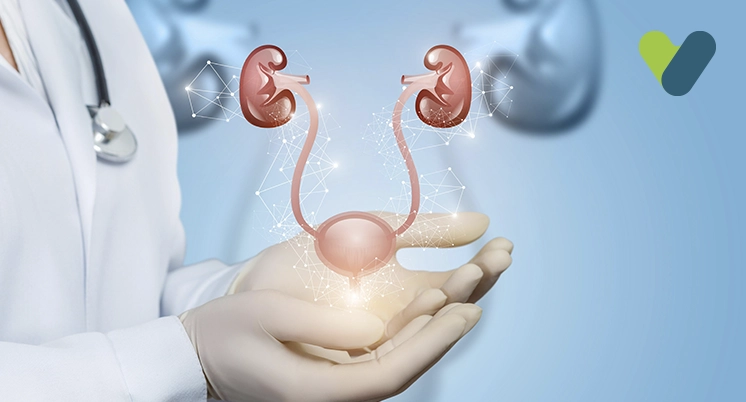Endocrine surgery – An Overview
Endocrine surgery or endocrinology surgery is performed to treat disorders affecting the glands in the endocrine system by removing a portion or all of the diseased glands. This surgery primarily addresses the diseases of the adrenal gland, thyroid, and parathyroid glands that may include tumours of the glands or an overactive gland.Glands are body parts (organs) that produce and release hormones into the bloodstream. These hormones send signals to tissues, telling them what to do in order to keep the body healthy. If a gland stops functioning properly, that is, produces either too much or too little hormone, a person may require endocrine surgery. The surgical procedures for endocrine treatment include conventional open surgeries, minimally invasive laparoscopic surgeries, and robot-assisted laparoscopic surgeries.
Which endocrine glands are the focus of endocrine surgery?
- Adrenal glands: Androgens are produced by the adrenal glands. These sex hormones have an impact on reproductive health and physical development. Cortisol is also produced by the adrenal glands. During the time of stress, the body produces this hormone. Aldosterone (produced by the adrenal glands), along with other hormones, aids in blood pressure regulation.
- Thyroid gland:
- Thyroid gland: The thyroid gland, located in the front of the neck, regulates the body’s metabolism. It has an impact on how the body generates warmth and uses oxygen and energy.
- Parathyroid glands: These are a group of four glands located behind the thyroid gland. They regulate the calcium and phosphorus levels in the body, which are essential for bone development.
What are some of the most common endocrine diseases treated surgically?
Various conditions can have an impact on the health of the endocrine glands. Endocrine surgery may be required to treat any one of the following conditions:Thyroid gland
- Graves' disease
- Goitre
- Hyperthyroidism
- Thyroid nodules
- Toxic (overactive) thyroid nodules
- Cancer of the thyroid
- Cowden syndrome
- Adenomas of the parathyroid gland
- Hyperparathyroidism
- Cancer of the parathyroid gland
- Cushing's disease
- Tumours of the adrenal gland
- primary aldosteronism (Conn's syndrome)
- Adrenocortical carcinoma
- Pheochromocytoma
- Neuroendocrine tumours
- Multiple endocrine neoplasia (MEN) syndromes
What are the different kinds of endocrine surgery or endocrinology surgery?
Endocrine surgeons perform a variety of procedures, including:- Adrenalectomy: The surgical removal of either one or both of the adrenal glands.
- Parathyroidectomy: The surgical removal of a single or multiple of the four parathyroid glands.
- Thyroidectomy: The surgical removal of the thyroid or one of its lobes (thyroid lobectomy).
- Pancreatectomy: The surgical removal of all or a part of the pancreas.
What occurs prior to endocrine surgery?
Patients should follow the surgeon's instructions on how to prepare for the procedure. Patients may be required to fast (not drink or eat anything) for a certain period of time prior to surgery. The surgeon may also instruct patients to refrain from taking certain medications, such as herbal supplements and vitamins. Patients might also need to stop smoking. Patients may also be subjected to different tests, including:- Blood tests, which are used to evaluate gland function
- CT scans, MRIs, and ultrasounds, which are used to identify the dimensions and position of the tumour or gland
- Bronchoscopy, which is used to determine whether a gland tumour is affecting the windpipe (trachea)
- Laryngoscopy, which is used to examine the health of the vocal cords (larynx)
- A needle biopsy, which is performed to check for cancer cells
- Upper endoscopy or a barium swallow, which is done to examine the oesophagus
What happens during endocrine surgery?
Endocrine surgery is performed as an inpatient procedure. Patients may be given general anaesthesia. The surgeon may perform one of the following surgical procedures, based on the endocrine system disorder:- Conventional open surgery: In order to remove the diseased gland, the surgeon will make an incision (cut) directly over the gland. Patients may require open surgery if the tumour is large and cancerous.
- Laparoscopic surgery: This is a minimally invasive surgical procedure that involves a few small incisions made by the surgeon. The gland is then removed using a laparoscope (a small tube with a video camera and light attached at the end). Patients may recover faster and with less scarring and pain since the incisions are smaller.
- Robotic surgery: This is also a minimally invasive procedure where the surgeon uses laparoscopic and robotic technology to remove the diseased portion or the entire diseased gland through small incisions.
How long does endocrine surgery take?
The time required for the surgery is determined by the complexity of the surgical procedure and the endocrine disorder. For example, removing a portion of the thyroid gland could take up to an hour. A total thyroidectomy, on the other hand, can require as much as 3 hours to surgically eliminate a malignant thyroid along with nearby lymph nodes. The surgeon will inform patients of the expected length of their surgery.What happens following endocrine surgery?
The surgeon may send diseased gland tissue to a lab for a biopsy. A specialist evaluates the tissue for determining whether the sample has cancerous cells. The findings from the biopsy could point to the need for additional treatments. People with thyroid cancer, for example, may require radioiodine therapy following thyroid surgery. Depending on the type of surgery, patients may be required to take certain medications for a brief duration or the rest of their lives. For example, patients may require:- Vitamin D and calcium following a parathyroidectomy
- Thyroid hormones following a thyroidectomy
- Steroids following an adrenalectomy
What are the advantages of having endocrine surgery?
Certain endocrine disorders can be treated with endocrine surgery. It can reduce or eliminate symptoms. Patients will feel better and have a better quality of life. Considering surgery to cure the disorders of the endocrine system can also reduce the risk of developing other health issues, such as:- Diabetes type II
- Heart failure and cardiovascular diseases
- Elevated blood pressure
- Blood clots, arrhythmias, and strokes
- Osteoporosis
- Kidney stones
What are the potential risks associated with endocrine surgery?
Endocrine surgery, like all surgeries, carries the risk of complications, including:- Bruising
- Infections
- Changes in blood pressure
- Injury to nearby organs, glands, blood vessels, or nerves
- Injury to the nerves in the larynx can result in permanent or temporary vocal changes such as a weak voice or hoarseness
- Blood loss, internal bleeding, or blood clots
- Calcium deficiency (hypoparathyroidism)
- Respiratory issues such as shortness of breath or pneumonia
How long does it take to recover from endocrine surgery?
After endocrine surgery, most people require to stay at least one night in the hospital. They might experience mild pain and a sore throat. Patients must strictly adhere to the discharge instructions. This will help their recovery and minimise the risk of complications. At-home recovery may consist of the following:- Resting and refraining from heavy lifting for a few days after the surgery.
- Changing surgical dressings on a regular basis.
- To relieve sore throat, patients may be asked to drink cold beverages, eat soft foods, or suck on ice chips.
- If necessary, begin steroids, hormone therapy, or supplements as instructed by the doctor.
- Taking pain relievers as prescribed by the doctor.
- Staying at home from work or school for about one to two weeks following the surgery.
When to consult a doctor?
If patients have any of the following symptoms, they should contact their doctor:- Redness, swelling, or bruising at the site of the incision that is present for more than a week.
- Fever
- Vocal changes or breathing difficulties
- Tingling or numbness in the face, hands, lips, or feet.
How much does endocrine surgery cost in India?
The endocrine surgery cost in India varies depending on a number of factors, including:- The type of procedure being performed
- Technology used for the surgery
- The location of the hospital or clinic
- The surgeon's experience and qualifications
- Any additional services or facilities provided
- Consultation fees and diagnostic test charges
- Post-operative expenses


